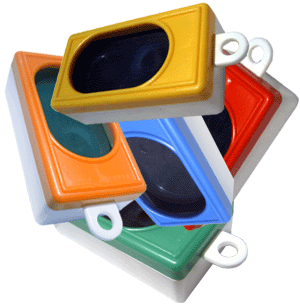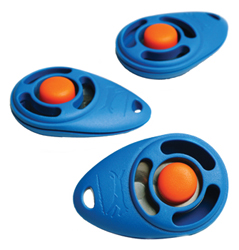House soiling is one of the major reasons pets are relegated to the back yard or given up for adoption. In young dogs, it is often a matter of teaching the animal where it is appropriate to eliminate. In intact adult or adolescent animals, marking behaviors are often the problem. In spayed and neutered pets, illness or stress can cause a change in elimination patterns. Below we have listed possible causes and solutions for various house soiling problems.
Dog is eliminating inside the house
Supervision is the key to preventing accidents by your pup. Closely supervise your puppy at all times. Watch for signals from the pup that he needs to go outside. Use a leash or baby gates to keep him close. Frequently offer opportunities to go out and go with the pup to reward him when he eliminates in the correct place.
Confine the pup when you are
asleep or out of the house. When you cannot closely watch him, take him out on
a leash to potty, then put him in his kennel so that
he will not have an opportunity to make a mistake. Make the kennel enjoyable
with chew toys and a water bowl. Watch carefully to make sure that any bedding
and toys are not being chewed and swallowed.
As soon as you take him out of the kennel, put him on leash and take him
outside again. The more often he is successful at eliminating outside, the
quicker he will figure it out.
When you are home, but have things to do, have the puppy on a leash attached to
you or a piece of furniture near you. This 'tie-down' is like a playpen for a
baby. The puppy can be near you, interact with you, but won't be able to get
out of your sight and get into trouble. As the puppy gets better, you might use
baby-gates or closed doors to keep him in the same room with you. The idea is
to be able to PREVENT the puppy from having accidents in the house. You can't
do that if you aren't watching the puppy.
Until you are SURE the puppy is housetrained, the ONLY time the pup should be
loose in the house is when you are playing with it one-on-one. It's not the
puppy's fault if it has an accident in the house. Either you weren't
supervising it closely enough, or you didn't take him outside often enough.
Remember, they can't reach the doorknob and they can't come up and say 'let me
out' -- at least not until you teach them how.
1. Take the puppy outside on a leash. There are several reasons for this.
ü The pup needs to learn to go outside on a leash
ü If the pup is allowed to run around the yard unsupervised, he will probably come back inside and eliminate on the floor because he was too busy 'playing' to do his business.
ü If the dog is clear across the yard when he pees or poops, you can't reward him as soon as he's done
So, put the leash on the puppy. Each time you take the pup out give some verbal cue like, "Outside, do you need to go outside?" Repeat this several times on your way to the door so he learns to associate the word "outside" with going out the door. Now, if you missed the signals for him to go out and catch him in the act of soiling, try to interrupt the process by calling out loudly "OUTSIDE, OUTSIDE!" Quickly rush him out while he still needs to go. Once outside, calmly encourage him to finish then praise him for going in the correct place.
2. Again, go out with the puppy when he relieves himself otherwise you will have no way of knowing if he has relieved outside and he may just wait until you bring him back inside to eliminate. There will be no faulty assumptions if you go out with him and are right there to reward him for the correct behavior. Take a treat or two out with you at first and give them to the puppy as soon as he finishes relieving himself. Say 'Good Potty' (or whatever you want to call it). The words don't matter as long as you are consistent. Soon you will be able to tell the puppy to 'potty' and he will know that you mean for him to take care of business outside.
3. If you have given the puppy opportunities to relieve himself outside and he does not eliminate out there, DO NOT allow him free access to your home. Bring him in and confine him, either in the crate or on a leash, until you can give him another chance to go outside.
4. If you missed the signals and you find a mess on the floor, do not punish the pup. Punishment at this time will only teach the pup that you cannot be trusted when there is a mess on the floor. He can't associate the mess with the action he did 2 or 20 minutes earlier. Chalk it up to experience and from now on, watch the puppy more closely. Calmly clean up the mess with one of the many special chemicals on the market for urine odors.
5. If you are consistent in taking the puppy outside and rewarding him, soon your puppy will be house trained. Congratulations!
If your dog is eliminating inside the
house
The first thing you need to do is make sure the urine or feces looks normal.
If not, you need to call for an appointment with your veterinarian.
If they do look normal, you need to evaluate what might have changed in your dog's schedule.
ü Did your daily schedule change?
ü Did you let the dog out/walk the dog in a timely manner?
ü New pet or person in the household?
ü Change of environment? Workers outside/next door? Strange noises? Thunder storm?
ü More activity than normal?
If none of these have occurred,
and the dog's eliminations are normal looking, then you may need to work on
re-housetraining it. Call and schedule an appointment so your veterinarian can make
sure there aren't any physical problems.
Once your pet has a clean bill of health, we can discuss how to handle the
house-soiling problem, give us a call.
(281) 440-6818
















